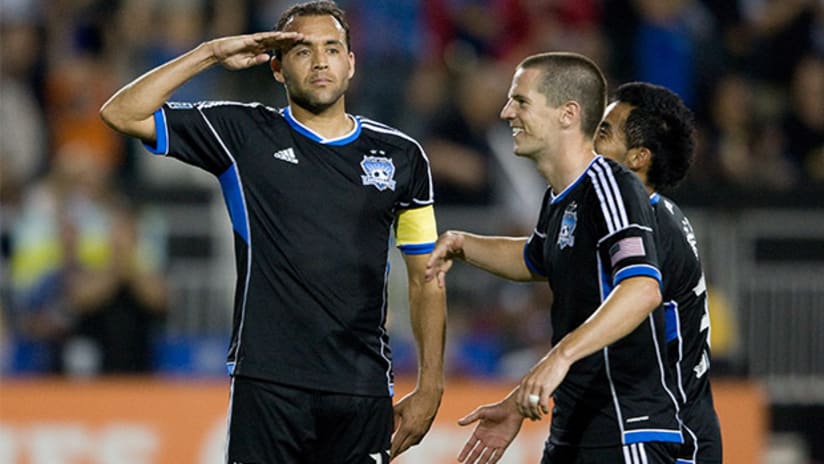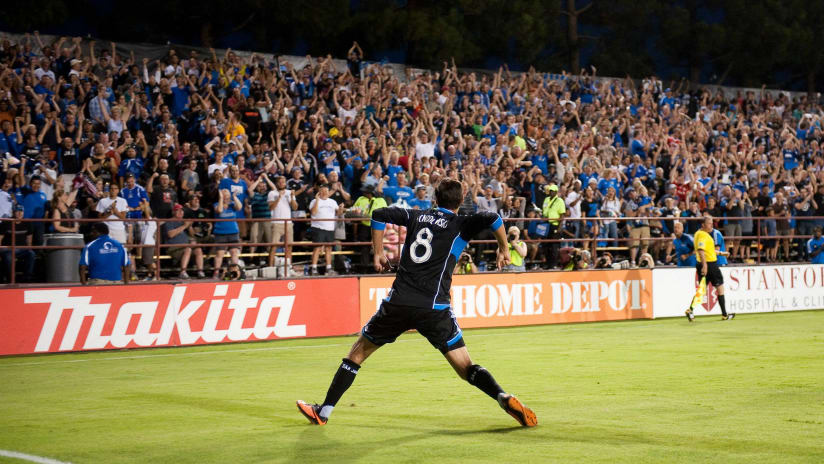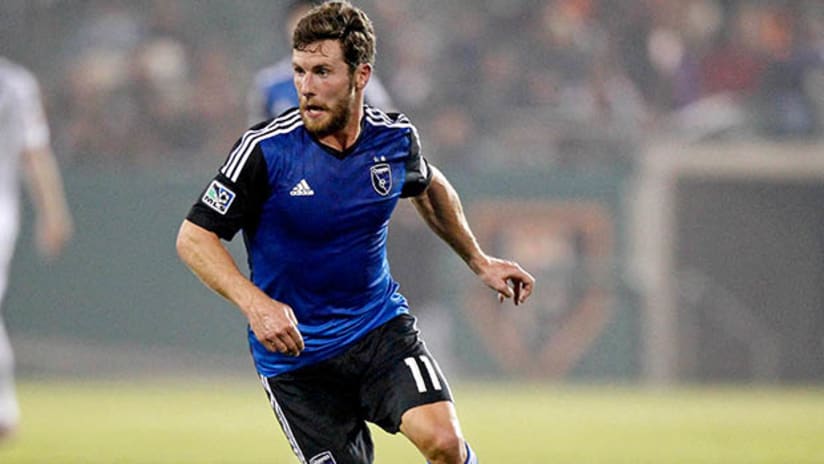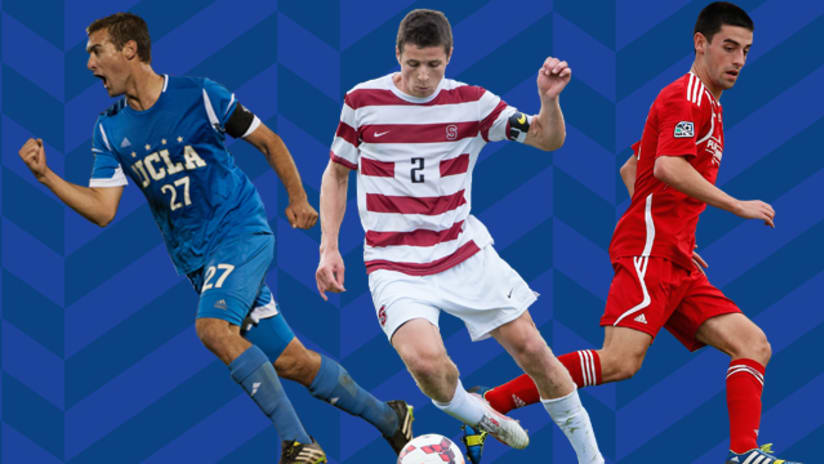Major League Soccer is not the oldest professional soccer league in the world, but it has earned the distinction as the longest lasting league in American soccer history. Founded in 1996, MLS survived a turbulent start and a lot of growing pains to this weekend reach the conclusion of its 18th season. And through those 18 years, countless players have come and gone pursuing their goals and growing the game.
But only one player has survived for the entire history of MLS. There to see it all begin nearly two decades ago was a fresh-faced 18-year old rookie midfielder from California’s heartland of agriculture, Ramiro Corrales. On Saturday, when the San Jose Earthquakes take on FC Dallas at Buck Shaw Stadium, Corrales will bid farewell as he becomes the last player that first suited up in 1996 to call an end to his career.
Not a product of the American college soccer system, Corrales instead grew his talents on the fertile soccer fields around sleepy Salinas, roughly an hour’s drive south of the Earthquakes’ professional pitch at Buck Shaw. When MLS held its first draft prior to its inaugural season, the teenage phenom was adjusting to a life in soccer with the local USISL club California Jaguars. That early February day in 1996 changed his life forever.
His selection by the Columbus Crew with the first pick of the ninth round, 81st overall, was unheralded at the time, but he would propel him into a career that no one, not even Corrales himself, could have predicted would last so long. 306 MLS matches later, Corrales is finally hanging up his boots with a legacy of consistency and longevity intact.
“Yeah, it took me awhile to get around that,” Corrales shared recently about spending more than half his life as a professional. “I’ve been doing this since 1995, even before MLS started. I was 17 years old when I started playing professionally, and after 19 seasons, it’s hard to give it up.”
Corrales never set foot in Columbus following the draft. Instead, he was immediately traded to his “hometown club” the San Jose Clash. The rookie quickly adapted to his surroundings and fittingly made his MLS debut on April 28 against the Los Angeles Galaxy. His first goal came on September 18 against the Tampa Bay Mutiny via a free kick. Looking back, it is no surprise that the sure-and-steady Corrales outlasted both a moniker and a franchise from that game.
“When this all started, we didn’t know how long it was going to last,” Corrales recalled, especially during those first few years of MLS. “And, now, after 18 seasons, we are still here, so it’s good to see.”
Corrales could easily be talking about himself in that statement, for the average career of a soccer player rarely reaches beyond the single digits in years. However, Corrales survived the lean years of MLS and after stops with the Miami Fusion and New York/New Jersey MetroStars — another pair of names now consigned to the MLS history books — came home to San Jose in 2001.
He featured throughout his first season back in San Jose and played in every game of the MLS Cup playoffs. Corrales capped off his successful return by playing all 96 minutes of the MLS Cup Final and earning the Earthquakes their first championship. By the time he celebrated his 25th birthday, the 8-year MLS veteran had won another MLS Cup for San Jose and had firmly cemented his name into club lore.
“If you practice good and play good, your teammates notice that,” Corrales explained as part of the recipe of his success. “That’s what I’ve always tried to do.”
Following the 2004 season, Corrales embarked on a 3-year stay in Europe, where he featured for Norwegian clubs Hamarkameratene and SK Brann. Bringing along the championship pedigree he developed with the Earthquakes, Corrales helped SK Brann win its first Premier League title in 44 years in 2007. Less than a year later, he was back in San Jose looking for the next big challenge of his career.
When the Earthquakes franchise was uprooted and moved to Houston following the 2005 MLS season, San Jose soccer fans had to put on hold their dreams of pursuing another championship. Fortunately, the club’s hiatus lasted only two years, and the new Quakes were back in the league in time for the 2008 season. Coinciding with their return was the homecoming of a now 30-year old Corrales to a league that resembled nothing like the one he started with more than a decade earlier.
“The quality of the play was better,” Corrales remembered. “The players were better. Tactically teams were way better than back in the days of ’96 and ’97. There’s better coaching. You can see there are some great teams over here. There are players coming over from Europe that are looking at MLS as a top league. It’s good to see.”
The Earthquakes didn’t capture the success of earlier in the decade, but the team fought valiantly, and with team captain Corrales their emotional leader, came within one game of returning to the MLS Cup Final in 2010. Then a first year assistant coach with the Quakes, current interim head coach Mark Watson recognized what a valuable resource he and the other coaches had, and still have, at their disposal.
“Definitely, he is a part of our leadership group,” Watson said of the 18-year veteran. “We speak to him regularly. He’s been around forever, so he has the luxury of having so much experience and dealt with most situations so he’s been great with that.”
Not one to seek out attention from the press or the public, Corrales took to his role of team captain as one would expect: lead by example. And though he hasn’t worn the captain’s armband much over the last season, Corrales was an integral part of the Earthquakes’ 2012 Supporters’ Shield winning campaign. Chronic back pain has limited his ability to suit up for the first team this season, but that hasn’t stopped the now 36 year old from contributing every day in training.
“He’s a big part of our club, and even if he’s not the on-field captain, he’s still held in very high regard here,” Watson shared. “Even though the body is getting a little bit older and maybe doesn’t move as quickly as he used to, he’s still a fantastic player and I think even the other players learn from watching him train and perform on the field. Ramiro has so much respect around here.”
Whether or not Corrales plays in the Earthquakes’ season finale on Saturday, he will finish his career as the undisputed most-decorated player in franchise history. Over a career that started in 1996, Corrales is the club’s all-time leader in games played (249), starts (227) and minutes played (20,117). Known more as an orchestrator rather than a finisher, he stands at no. 4 with 32 assists and no. 11 with 16 goals in Quakes history. And someday soon, his #12 jersey will join the others in the club’s hall of fame.
“I am one of the originals,” Corrales stated almost disbelievingly as he reflected on his time in MLS. “I’m the only one still playing after 18 seasons, and after so many years, I am proud of that. I never thought in my wildest dreams that I was going to be playing this long.”
Robert Jonas is a writer for CenterLineSoccer.com and SJEarthquakes.com. Send him feedback on Twitter: @RobertJonas




